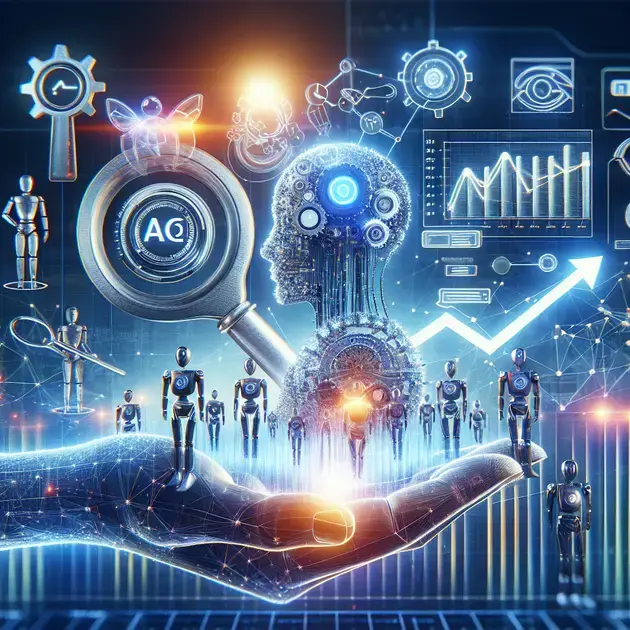Unlocking the Potential of Artificial Intelligence
When it comes to improving your website’s visibility on search engines, search engine optimization (SEO) is key. As search algorithms continue to evolve, it’s essential to stay updated on the latest SEO trends and techniques to ensure your site ranks well.
One recent trend in the world of SEO is the increasing importance of mobile optimization. With more and more users browsing the web on their smartphones, search engines like Google have placed a higher emphasis on mobile-friendly websites in their rankings.

Maximizing the Power of Artificial Intelligence in SEO
Artificial Intelligence (AI) is rapidly transforming the landscape of Search Engine Optimization (SEO), enhancing the efficiency and effectiveness of digital marketing strategies. To maximize the power of AI in SEO, one essential step is to utilize AI-powered tools and platforms. One such tool is IBM Watson, an AI-driven platform that offers advanced analytics and insights for SEO optimization.
Another crucial aspect of leveraging AI in SEO is the implementation of natural language processing algorithms to understand user intent and deliver more relevant content. Platforms like Google Cloud Natural Language provide developers with the tools to analyze and extract insights from unstructured text data, improving the overall SEO performance.
Furthermore, incorporating AI algorithms for data analysis and keyword research can significantly boost organic search rankings. Tools like SEMrush utilize AI to identify high-value keywords and trends, allowing SEO professionals to optimize their content effectively.
In addition, harnessing the power of AI-powered chatbots can enhance user experience and drive engagement on websites. Platforms like Chatfuel enable businesses to create AI chatbots that provide personalized recommendations and support, ultimately improving SEO metrics such as bounce rate and session duration.
Overall, by strategically integrating AI technologies and tools into SEO strategies, businesses can stay ahead of the competition and achieve higher visibility and conversions in the digital realm.
The Future of SEO: Leveraging Artificial Intelligence for Success
The future of SEO lies in harnessing the full potential of Artificial Intelligence (AI) to drive success in digital marketing efforts. To leverage AI for SEO success, businesses need to focus on implementing advanced machine learning algorithms to analyze and predict search engine trends. Platforms like Google AI provide tools for developing AI models that can enhance keyword targeting and content optimization.
Another key aspect of the future of SEO is the utilization of AI-powered predictive analytics to anticipate user behavior and tailor marketing strategies accordingly. Tools like SAS Predictive Analytics enable businesses to forecast customer preferences and optimize website content for improved search engine rankings.
Moreover, the integration of AI-driven image and voice search technologies is poised to revolutionize the way users interact with search engines. Platforms like Google Cloud Vision offer image recognition capabilities, allowing businesses to optimize visual content for better SEO performance.
By embracing AI technologies such as natural language processing and neural networks, businesses can enhance their SEO strategies and stay competitive in the evolving digital landscape. The future of SEO is intricately linked with the advancements in AI, providing endless possibilities for innovative marketing techniques and enhanced user experiences.
Revolutionizing SEO Strategies with Artificial Intelligence
Artificial Intelligence (AI) is revolutionizing the way businesses approach Search Engine Optimization (SEO) strategies, offering new opportunities for optimization and growth. To revolutionize SEO strategies with AI, businesses should first focus on leveraging AI-powered content generation tools. Platforms like Concured use AI algorithms to analyze content performance and provide recommendations for creating SEO-friendly and engaging content.
Furthermore, implementing AI-driven competitor analysis tools can offer valuable insights into industry trends and consumer behavior. Platforms like SpyFu utilize AI to provide competitive intelligence and enhance keyword targeting strategies for improved search engine rankings.
Another crucial aspect of revolutionizing SEO with AI is the adoption of AI-powered SEO audits and recommendations. Tools like SERPstat offer comprehensive SEO audits and insights, helping businesses identify areas for improvement and optimize their online presence effectively.
Moreover, AI technologies can streamline the process of link building and outreach, improving the authority and credibility of websites. Platforms like BuzzSumo leverage AI to identify high-quality backlink opportunities and enhance link building strategies for better SEO performance.
By embracing AI-driven tools and technologies, businesses can revolutionize their SEO strategies, drive organic traffic growth, and achieve sustainable success in the competitive digital landscape.

Unlocking the Potential of Artificial Intelligence: Harnessing the Power of AI for Business Growth
Artificial Intelligence (AI) has revolutionized the way businesses operate, offering unprecedented opportunities for growth and efficiency. By harnessing the power of AI, companies can streamline processes, make data-driven decisions, and enhance customer experiences. One of the key areas where AI is making a significant impact is in the optimization of business operations.
When it comes to industries like e-commerce, AI-powered algorithms can analyze consumer behavior patterns to predict trends, personalize recommendations, and streamline inventory management. This level of automation not only saves time and resources but also leads to increased sales and customer satisfaction. Implementing AI solutions in supply chain management can further optimize logistics, reduce costs, and minimize errors.
Moreover, AI enables businesses to gain valuable insights from vast amounts of data, leading to more informed strategic decisions. By leveraging machine learning algorithms, organizations can identify market trends, forecast demand, and develop targeted marketing campaigns. This data-driven approach not only enhances operational efficiency but also gives businesses a competitive edge in the market.
In the realm of customer service, AI chatbots and virtual assistants are transforming the way companies interact with their clients. These intelligent systems can provide instant support, answer queries, and even personalize recommendations based on user preferences. By integrating AI technologies into customer service operations, businesses can improve response times, enhance user experiences, and build stronger relationships with their customers.
Overall, harnessing the power of AI for business growth is essential in today’s competitive landscape. By embracing innovation and leveraging AI technologies effectively, companies can unlock new opportunities, drive revenue, and stay ahead of the curve in their respective industries.
Innovative Ways AI is Transforming Industries
The integration of Artificial Intelligence (AI) in industries across the board is ushering in a new era of innovation and efficiency. From healthcare to finance, AI is revolutionizing traditional processes and paving the way for groundbreaking advancements. One of the most notable areas where AI is driving transformation is in the field of healthcare.
AI-powered solutions are enabling healthcare providers to deliver more personalized care, diagnose diseases accurately, and enhance treatment outcomes. By analyzing large datasets, AI algorithms can identify patterns, predict potential health issues, and recommend tailored treatment plans for patients. Additionally, AI-based medical imaging tools are improving diagnostic accuracy, reducing errors, and ultimately saving lives.
Furthermore, in the financial sector, AI is playing a crucial role in enhancing decision-making processes, minimizing risks, and detecting fraudulent activities. Machine learning algorithms can analyze financial data in real-time, identify anomalies, and streamline trading operations. This level of automation not only improves efficiency but also ensures compliance with regulatory standards.
AI is also making significant strides in the transportation industry, particularly with the development of autonomous vehicles and smart traffic management systems. Self-driving cars powered by AI algorithms can enhance road safety, reduce traffic congestion, and revolutionize the way people commute. Moreover, AI sensors and predictive analytics enable efficient route planning, dynamic pricing strategies, and real-time updates for travelers.
Overall, the innovative ways in which AI is transforming industries are reshaping the future of work, driving efficiencies, and unlocking new possibilities for growth. By embracing AI technologies and staying abreast of emerging trends, organizations can stay competitive and thrive in a rapidly evolving landscape.
Exploring the Impact of Artificial Intelligence on Society
The impact of Artificial Intelligence (AI) on society is profound, with far-reaching implications that touch every aspect of our lives. From healthcare to education, AI technologies are reshaping how we live, work, and interact with the world around us. One of the key areas where AI is making a significant impact is in the realm of smart cities.
AI-powered systems are being used to optimize urban planning, improve public services, and enhance sustainability efforts in cities worldwide. Intelligent algorithms can analyze data in real-time, predict traffic patterns, and allocate resources efficiently. This level of automation not only reduces congestion and pollution but also enhances quality of life for residents.
In the education sector, AI is revolutionizing the way students learn, teachers instruct, and schools operate. Personalized learning platforms powered by AI algorithms can adapt to individual student needs, provide targeted support, and track learning progress. Additionally, AI-enabled virtual classrooms enable remote learning opportunities, bridge educational gaps, and foster a more inclusive learning environment.
AI’s impact on the workforce is also significant, with automation reshaping traditional job roles and creating new opportunities for skill development. While AI technologies offer efficiency gains and productivity enhancements, they also raise concerns about job displacement and the need for upskilling. As society navigates this technological shift, it is crucial to prioritize continuous learning, adaptability, and innovation in the workforce.
Overall, exploring the impact of Artificial Intelligence on society requires a multidisciplinary approach, ethical considerations, and a proactive stance towards technological advancements. By harnessing the potential of AI for social good, organizations, policymakers, and individuals can create a more inclusive, sustainable, and thriving future for all.
Conclusion
In conclusion, Artificial Intelligence (AI) plays a pivotal role in revolutionizing businesses across various sectors. By harnessing AI technologies effectively, companies can streamline operations, enhance customer experiences, and gain valuable insights for informed decision-making. The impact of AI in industries like e-commerce, healthcare, finance, and transportation is driving efficiency, innovation, and transformative advancements.
Moreover, the integration of AI-powered solutions in optimizing business operations, healthcare diagnostics, financial decision-making, and smart transportation systems is reshaping the future of work. AI’s ability to analyze data, predict patterns, and improve efficiencies is providing businesses with a competitive edge and unlocking new growth opportunities. With AI-driven technologies, organizations can stay ahead in a rapidly evolving landscape and thrive in the face of technological advancements.
Furthermore, the profound impact of AI on society, particularly in smart cities, education, and workforce automation, underscores the need for a multidisciplinary approach and ethical considerations. By prioritizing continuous learning, adaptability, and social good, individuals, policymakers, and organizations can create an inclusive, sustainable, and thriving future for all. Embracing the potential of AI not only enhances operational efficiency but also fosters innovation, empowers communities, and drives towards a more interconnected and efficient world.
| Produto | Descrição | Link |
|---|---|---|
| Produto 1 | Descrição 1 | |
| Produto 2 | Descrição 2 | |
| Produto 3 | Descrição 3 | |
| Produto 4 | Descrição 4 |
Share this content:









Publicar comentário